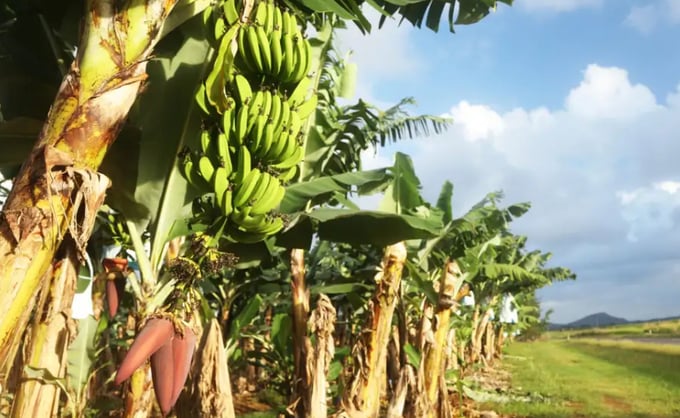May 28, 2025 | 13:32 GMT +7
May 28, 2025 | 13:32 GMT +7
Hotline: 0913.378.918
May 28, 2025 | 13:32 GMT +7
Hotline: 0913.378.918

Most banana plants are vulnerable to the fungal disease TR4.
A genetically modified banana has been approved for growing on farms for the first time. Regulators in Australia and New Zealand have given the go-ahead to a strain of the Cavendish banana altered to be resistant to a devastating fungal disease that has spread to many countries worldwide.
The Office of the Gene Technology Regulator in Australia issued a licence permitting the commercial growth of the modified banana on 12 February.
On 16 February, Food Standards Australia New Zealand approved it as a food, concluding that it is as safe and nutritious as conventional bananas. The food ministers of Australia and New Zealand can request a review of the decision in the next 60 days. If they don’t, the approval will be final.
The first banana to be widely eaten in Western countries was a variety called Gros Michel. But by the 1950s, the spread of a Fusarium fungus strain called tropical race 1 (TR1), which causes Panama disease, forced farmers to switch to the Cavendish banana. Although it reportedly doesn’t taste as nice as the Gros Michel, the Cavendish is highly resistant to TR1.
Now, another strain of Fusarium, called TR4, is spreading worldwide. It can kill many varieties, including the Cavendish.
A team led by James Dale at the Queensland University of Technology, Australia, created the resistant strain of banana, called QCAV-4, by adding a gene from a wild banana.
This decision is “a very important step towards building a safety net for the world’s Cavendish bananas from TR4 which has impacted many parts of the world already”, Dale said in a statement.
In Australia, quarantine measures are currently limiting the spread of TR4, with only a small number of outbreaks each year. So, for now, there are no plans to grow the QCAV-4 banana on a large scale or to sell it to consumers.
However, other countries where TR4 is more of a problem may decide to adopt the genetically modified banana. Dale’s team now plans to use CRISPR gene editing to make the QCAV-4 banana resistant to another major fungal disease called black sigatoka, which could mean it is even more appealing to farmers.
A team in Kenya has already used CRISPR to create a strain of the Gonja Manjaya variety that is free from banana streak virus – a pathogen that integrates itself into the genome of bananas.
Genetically modified (GM) crops are now widely grown in many countries worldwide, but in some places, such as the UK and European Union, few have been approved for farmers to grow.
In Australia, only four GM crops have previously been approved. They are a safflower whose oil has a higher level of oleic acid, and herbicide-resistant strains of rapeseed (canola), Indian mustard and cotton.
However, Australia and New Zealand have approved a wider range of GM crops and products for eating, similar to the situation in the UK and EU.
newscientist

(VAN) Vikas Rambal has quietly built a $5 billion business empire in manufacturing, property and solar, and catapulted onto the Rich List.

(VAN) Available cropland now at less than five percent, according to latest geospatial assessment from FAO and UNOSAT.

(VAN) Alt Carbon has raised $12 million in a seed round as it plans to scale its carbon dioxide removal work in the South Asian nation.

(VAN) Attempts to bring down the price of the Japanese staple have had little effect amid a cost-of-living crisis.

(VAN) Fourth most important food crop in peril as Latin America and Caribbean suffer from slow-onset climate disaster.

(VAN) Shifting market dynamics and the noise around new legislation has propelled Trouw Nutrition’s research around early life nutrition in poultry. Today, it continues to be a key area of research.

(VAN) India is concerned about its food security and the livelihoods of its farmers if more US food imports are allowed.